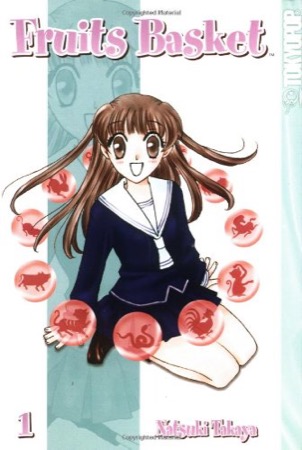Remember Fruits Basket?

Jason Thompson talks about one of the greatest shojo series of all, Fruits Basket, when he decided to reread all 23 volumes over a weekend.
As Jason points out, “this is the manga that kept Tokyopop alive from 2004 to 2009.” It was remarkably popular in the U.S. market and probably the best-known shojo at the time. It’s the story of a self-sacrificing girl who gets involved with a family where everyone turns into one of the animals from the Chinese zodiac when embraced.
His walk through the series brought back a lot of memories from when I read it — and then gave it up back in 2007. I wish I’d had his notes then; I might have stayed with it longer. For example, he points out:
Here’s one way in which Fruits Basket is special: I actually like these little meditations on kindness and loneliness and sociability that the characters say in this manga. They aren’t cheesy, instead, they are pretty wise and thoughtful.
He also sums up the appeal of the series as, “When the characters aren’t wracked with sobs thinking about how their parents abused them, this manga is full of summer homes and vacations and good times…. The supernatural elements of the series seem to be fading as it goes on, which is sort of a pity, because Takaya is really good at drawing cute animals.”
I never did finish Fruits Basket, and I imagine I never will, since the books are out of print. Did you read it? Looking back, did you enjoy it? Do you recommend others seek it out?

5:06 pm
I read it in the French edition (published by Delcourt Manga and still in print as far as I know). Yes, I enjoyed it, though I do think this is one of those series best read end to end or at least several volumes at a time – partly because of the large and potentially confusing cast of characters and partly because the emotional intensity builds over time. There were aspects of it I could have done without – e.g. the whole subplot about Yuki’s fan-club, and some of the jokier bits (shoujo manga humour doesn’t always translate well into English, linguistically or culturally) – but overall I felt that Takaya had a firm grasp on her theme, story and characters; unlike, say, a fair bit of Kaori Yuki’s stuff. By the time she reached the ending (which literally and quite unexpectedly had me in tears) it had been earned.
As for said theme: Fruits Basket starts out like the most light and predictable of shoujo fluff, and then slowly turns into an examination of how trauma can be passed down through generations of a family, warping relationships and destroying anyone caught in its toxic web – until Tohru’s innocence and kindness begins to dissolve the evil spell. (Sort of Sleeping Beauty with the genders reversed, perhaps?). Except Tohru is no standard-issue bright and spunky shoujo heroine: she understands other people’s pain through having survived her own, and she survived *that* through the example of her parents. The story may be fantastic, but the emotion and psychology powering it ring absolutely true. I’d definitely recommend Fruits Basket for early teens up – though it may be adults who can get most out of it.
PS: I was disappointed in one thing – the nature of the “big reveal” about three-quarters of the way through. I felt it meant one part of the story took an unnecessary turn for the conventional; but author’s privilege, I suppose.
5:07 pm
I believe I dropped it around the time we started seeing more of Yuki and his schoolmates, because it just felt like padding to me. I didn’t care about those characters, and it seemed like the author was just trying to extend out the series. I also felt — and I’m not expecting others to share this, it was just me — as though the trauma was so much that I was never going to believe “but her good-heartedness fixed it” as a resolution. It was too out of balance in its portrayal.
But thank you for the detailed perspective, I appreciated it.
5:07 pm
Fruit Baskets was the manga that started it all: I became a manga fan after reading it. I thought it was quite wonderful and definitely worth reading from beginning to end. Like Johanna says, it’s a manga that illustrates how trauma can be passed down through a family- in this case, turning into the creatures of the zodiac is a powerful metaphor of that trauma. It is also, though, a wonderful story about imagination- having the ability to imagine a new way of being, of existing, beyond what the status quo had dictated to the family. Tohru’s joining the household launched this process, and through her acceptance, affection, and kindness, she encouraged the characters to reclaim their self worth and even identities. I think it is a story about finding and accepting oneself, of imagining possibilities, and finally, of forgiveness. The characters heal and move on freely because they don’t stay tied up to their resentments. It is a difficult process, but one necessary for growth.
I agree that parts of it got to be very angst-filled and some digressions got to be a bit distracting…But I found that despite all that, I was willing to read on because I had grown to care for the characters and found myself rooting for them.
Plus, little Momiji was just too adorable. :-)